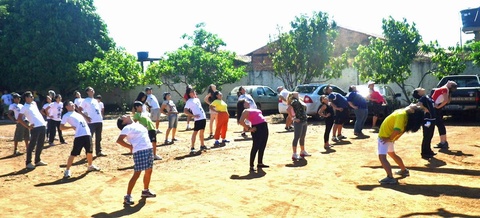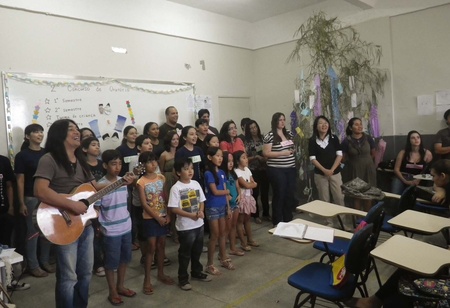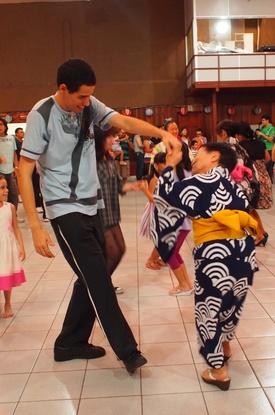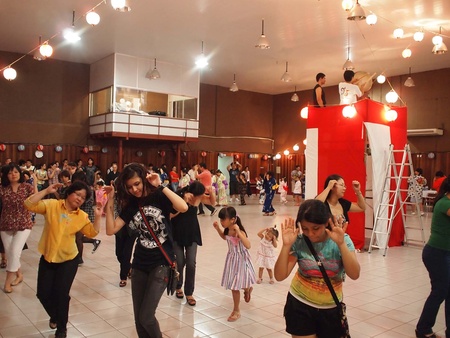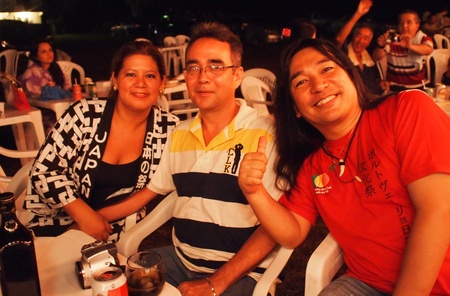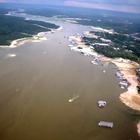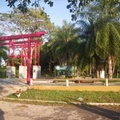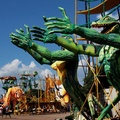One day, while I was working in the Japan-Brazil office, I was approached by Mr. Kawada, a living encyclopedia of the Amazon who is over 80 years old.
"The sports day is next week, so could you help me buy the prizes?"
We got into Kawada's car and headed for Centro.
A few days later, under the scorching hot tropical sun, a sports day was held at the Manaus Country Club, a golf course in the city. Participants were Japanese-Brazilians, Japanese people, and Brazilians living nearby. The prizes we had won were safely delivered to the many children who had been waiting for them. Brazilians love giving and receiving prizes, giveaways, and presents, and the bingo game is the most exciting of all the events. In the field, with Misora Hibari playing at full volume, adults and children alike were all engrossed in the competition, looking like they were having fun.
Since graduating from junior high school, I had never properly participated in a sports day, so I was shocked to find that a sports day like the good old days was being held on the other side of the earth, in a tropical rainforest about three degrees south of the equator. Bottle fishing, scavenger hunts, ball tossing, tug-of-war, and foot races. The background music that plays brings me back to the nostalgic Showa era.
Not only do they hold sports days here, but they also hold events such as Coming of Age Day, Hinamatsuri, Children's Day, Tanabata, and Bon Odori on Respect for the Aged Day every year. Annual events that modern Japanese people are gradually forgetting are still firmly preserved here.
On Hinamatsuri, teachers from the children's class at the Western Amazon Japan-Brazil Association Japanese Language School take the lead in celebrating the day. They eat "hina arare," which is not cheap in Manaus, sing Hinamatsuri songs with the children, and do origami and other recreational activities. A gorgeous display of Hina dolls, with many tiers, adds a touch of glamour to the event.
Every August is the season for Bon Odori. Since there are several Japanese settlements around Manaus, we were able to enjoy Bon Odori and fireworks about three times a week. The first week was Efegenio Sales, the second week was Bella Vista, and the third week was Nippaku.
A memorial service is held before the Bon Odori dance begins. A monk is called from a temple in São Paulo to recite sutras, and everyone offers prayers for the souls of those who came to this uncharted territory from Japan before and after the war and worked tirelessly to do so. Many events held in Brazil are influenced by Christianity, and many of the immigrants have converted to Christianity, but this memorial service is conducted in accordance with Buddhism. Many immigrants died in the harsh environment, described as a "green hell," from diseases such as malaria and dengue fever, or from unforeseen accidents.
The Bon Odori venue is decorated with red and white lanterns made by local Japanese companies, and a taiko drum is set up on top of a giant tower.
First, the ladies of the first and second generation who have lived in this area for a long time start dancing skillfully in stylish yukata robes, and then the Brazilians follow suit and start dancing. They all dance skillfully to familiar songs in Japan, such as Tankobushi and Tokyo Ondo, as well as songs by Doraemon Ondo, Nanase Aikawa, and the Checkers.
Brazilians don't mind if the yukata is a little strange. Smiles are on everyone's faces, and as the night goes on, the circle of people dancing gets bigger and bigger. In the middle of nature, the Bon Odori of the Amazon continues late into the night.
Sports day at a country club. First generation Brazilians who came from Japan on a 40-50 day boat trip, second and third generation Brazilians born in Brazil, and local Brazilians with no roots in Japan all run together on the field under the scorching sun. After fighting in full force, smiles and laughter fill the air.
Bon Odori in the jungle. Japanese expatriates and young Brazilians dance together around the drums. The food stalls are lined with Brazilian yakiniku, Peruvian ceviche (marinated), and Japanese manju. Kawada, with a beer in hand, mutters as he watches the large fireworks floating in the pitch black sky of the jungle.
"Wow. This year's fireworks are really impressive."
Sports days, Bon Odori dances, and other cultural elements brought by Japanese immigrants have become wonderful communication tools connecting Japan and Brazil.
© 2015 Toshimi Tsuruta


